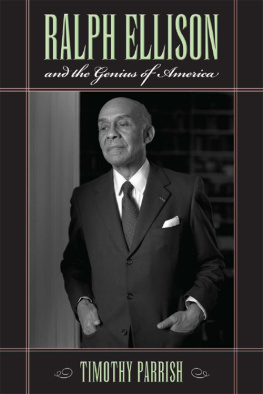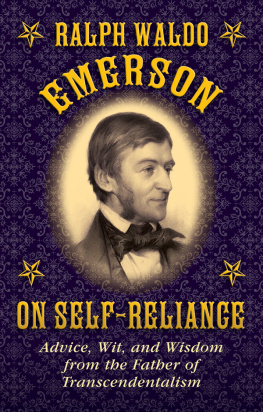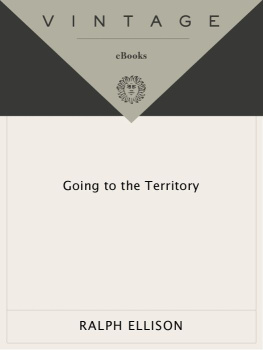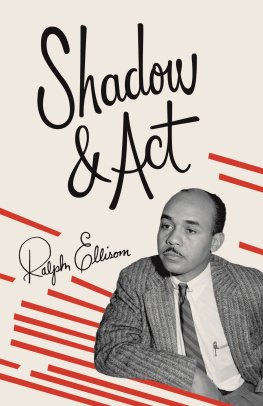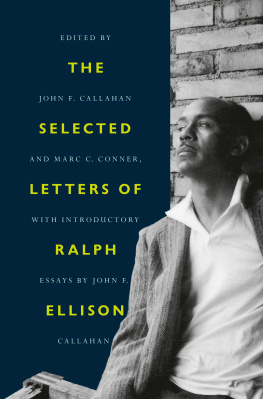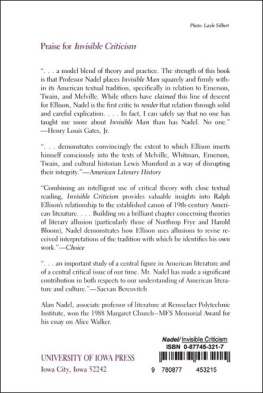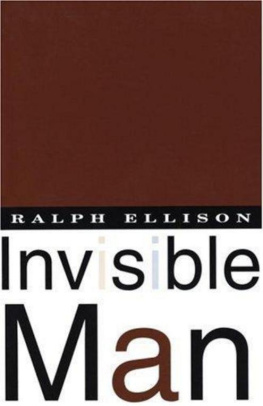Ellison Ralph Waldo - Ralph Ellison and the Genius of America
Here you can read online Ellison Ralph Waldo - Ralph Ellison and the Genius of America full text of the book (entire story) in english for free. Download pdf and epub, get meaning, cover and reviews about this ebook. City: Amherst, year: 2012, publisher: University of Massachusetts Press, genre: Science. Description of the work, (preface) as well as reviews are available. Best literature library LitArk.com created for fans of good reading and offers a wide selection of genres:
Romance novel
Science fiction
Adventure
Detective
Science
History
Home and family
Prose
Art
Politics
Computer
Non-fiction
Religion
Business
Children
Humor
Choose a favorite category and find really read worthwhile books. Enjoy immersion in the world of imagination, feel the emotions of the characters or learn something new for yourself, make an fascinating discovery.
- Book:Ralph Ellison and the Genius of America
- Author:
- Publisher:University of Massachusetts Press
- Genre:
- Year:2012
- City:Amherst
- Rating:5 / 5
- Favourites:Add to favourites
- Your mark:
- 100
- 1
- 2
- 3
- 4
- 5
Ralph Ellison and the Genius of America: summary, description and annotation
We offer to read an annotation, description, summary or preface (depends on what the author of the book "Ralph Ellison and the Genius of America" wrote himself). If you haven't found the necessary information about the book — write in the comments, we will try to find it.
Ralph Ellison and the Genius of America — read online for free the complete book (whole text) full work
Below is the text of the book, divided by pages. System saving the place of the last page read, allows you to conveniently read the book "Ralph Ellison and the Genius of America" online for free, without having to search again every time where you left off. Put a bookmark, and you can go to the page where you finished reading at any time.
Font size:
Interval:
Bookmark:

BY THE SAME AUTHOR
From Civil War to the Apocalypse:
Postmodern History and American Fiction
(2008)
Walking Blues: Making Americans
from Emerson to Elvis
(2001)

Copyright 2012 by University of Massachusetts Press
All rights reserved
Printed in the United States of America
LC 2011044230
ISBN 978-1-55849-922-5 (paper); 921-8 (library cloth)
Designed by Jack Harrison
Set in Adobe Caslon Pro by House of Equations, Inc.
Printed and bound by Thomson-Shore, Inc.
Library of Congress Cataloging-in-Publication Data
Parrish, Timothy, 1964
Ralph Ellison and the genius of America / Timothy Parrish.
p. cm.
Includes bibliographical references and index.
ISBN 978-1-55849-922-5 (pbk. : alk paper)
ISBN 978-1-55849-921-8 (library cloth : alk. paper)
1. Ellison, RalphCriticism and interpretation. I. Title.
PS3555.L625Z84 2011
813.54dc23
2011044230
British Library Cataloguing in Publication data are available.
For Ralph Ellison,
From the Territory He Dreamed a Nation
This book began in part as a response to Arnold Rampersads 2007 biography of Ralph Ellison. It seemed to me that Rampersads book had exhausted a line of thinking that began with the early reviews of Invisible Man which criticized Ellisons presentation of American black experience. This view of Ellison is rooted in the assumptions of the preBrown v. Board of Education world which had inspired Invisible Man but which Ellisons career ultimately worked to dismantle. This vein of response continued through the 1960s and 70s as some readers questioned Ellisons authenticity as a black intellectual, while others suggested that Ellison had failed of his promise because he did not publish a second novel. The dubious achievement of Rampersads book was to combine these two strains into one. Rather than highlighting Ellisons extraordinary, unique achievements as a novelist and intellectual, his challenging post-Brown vision, Rampersad tried to draw attention to what Ellison had not achieved and had not written. Although this seemed to me a counterintuitive way to go about a biography, I recognized that the perspective Rampersad advanced to define Ellisons life was in fact a common one in the voluminous writing that Ellisons work and life inspired and continues to inspire.
At first, my aim was simply to re-imagine Ellisons career in terms of what he achieved rather than what he did not achieve. Thus, instead of speculating about why Ellison did not publish more than one novel in his lifetime, I tried to show what a truly revolutionary, wide-ranging intellectual figure he was. Having written one of the handful of classic American novels, Ellison had a career as a public intellectual no less remarkable than that of Emerson or Thoreau, his closest peers as a theorist of American possibility. As my version of Ellison moved beyond the highly policed areas of English and African American studies departments, I realized that I was not alone in following Ellisons long shadow to unlikely places. The political scientists Danielle Allen and Lewis Morel, the historian Leon Litwack, and the social historian Richard Kluger had all been working to establish Ellisons importance as something more than the author of one well-regarded novel whose personal example offended some of his readers.
Then, as I was close to finishing this book, something remarkable happened. Ellisons second novel, never titled but long labored over, was published by John Callahan and Adam Bradley as Three Days before the Shooting. Suddenly, nearly sixty years after Invisible Man, the published works of Ralph Ellison had nearly doubled. Though unfinished and difficult to absorb quickly, Ellisons book is clearly a major work of American literature, just as Robert Musils unfinished novel The Man without Qualities or Franz Kafkas The Trial and The Castle are major works of German literature. Like Musils work in particular, Ellisons novel has seemingly countless variants and will likely exist in multiple forms. Its publication, like a message from beyond the grave, tells us that Ellisons legacy remains to be confronted and that his future place in American letters and cultural history is not the one that was prepared for him during his lifetime. Numerous brilliant readings of Invisible Man exist, and there are many more to be written, but I think we are far from coming to terms with the meaning of Ellisons career largely because he was misunderstood during his own time. As the publication of Three Days reminds, Ellison was forever addressing an America that is still unrealized. His ideal readers most likely never knew the world he knew and live closer to the future America he addressed.
Like his unfinished second novel, Ellisons career was gigantic and protean. During his life, he went from being Richard Wrights apprentice to being the confidante of Robert Penn Warren and an adviser to President Lyndon Baines Johnson. Arguably no one in American letters, except perhaps Frederick Douglass, has traveled as far as Ellison did. With Wright, Ellison had despaired of the position of blacks in American society. Together they dreamed of integrating the American literary canon and worked to improve the position of blacks in American life. With Warren and Johnson, Ellison endeavored to realize the potential of the Civil Rights movement. Together they broadened notions of American culture and society so that Americans would understand that, as Ellisons famous narrator declared, our fate is to become one, and yet manythis is prophecy, not description. The election of Barack Obama as president of the United States was, in a limited way, the symbolic fulfillment of Ellisons journey.
Every act of Ellisons imagination was inspired by his commitment to a vision of American history and possibility. Yet, Ellison also demanded something more from his life than simply struggling for the improvement of the American polis. He wanted to be and was an artist. He aspired to write literary works that added to the Western literary tradition that comes from Homer and Virgil, goes through Dante, Shakespeare, Milton, and Cervantes, before making its way through the genre of the novel. To Ellison, Invisible Man was the definitive reply to and summation of the nineteenth-century American tradition of Stowe, Hawthorne, Melville, Twain, James, Crane, and, finally, Faulkner.
Of all the great American novelists, Ellison was probably the most well read, most gifted student of literature. He read and absorbed everything, seemingly, from Homer to Faulkner. Not even Henry James had a more refined sense of literary possibility than Ellison. Yet, despite the numerous famous literary friends Ellison made during his life, his studies were pursued from an isolated position within a library that had been segregated according to race. Neither James nor Ellison graduated college, but Ellison had to earn and to steal his education in a way that even James, who fled America in order to write, likely could not have imagined. Ellisons stolen education speaks to his isolated place in American letters but also to his commitment to join and transform this tradition come hell or high water.
Ellison was an outsider to the Western literary tradition that inspired him, and that knowledge complicated his every literary gesture. Always, whatever Ellison read or wrote and whichever audience, present or future, he addressed, he did so from the perspective of being a
Font size:
Interval:
Bookmark:
Similar books «Ralph Ellison and the Genius of America»
Look at similar books to Ralph Ellison and the Genius of America. We have selected literature similar in name and meaning in the hope of providing readers with more options to find new, interesting, not yet read works.
Discussion, reviews of the book Ralph Ellison and the Genius of America and just readers' own opinions. Leave your comments, write what you think about the work, its meaning or the main characters. Specify what exactly you liked and what you didn't like, and why you think so.

